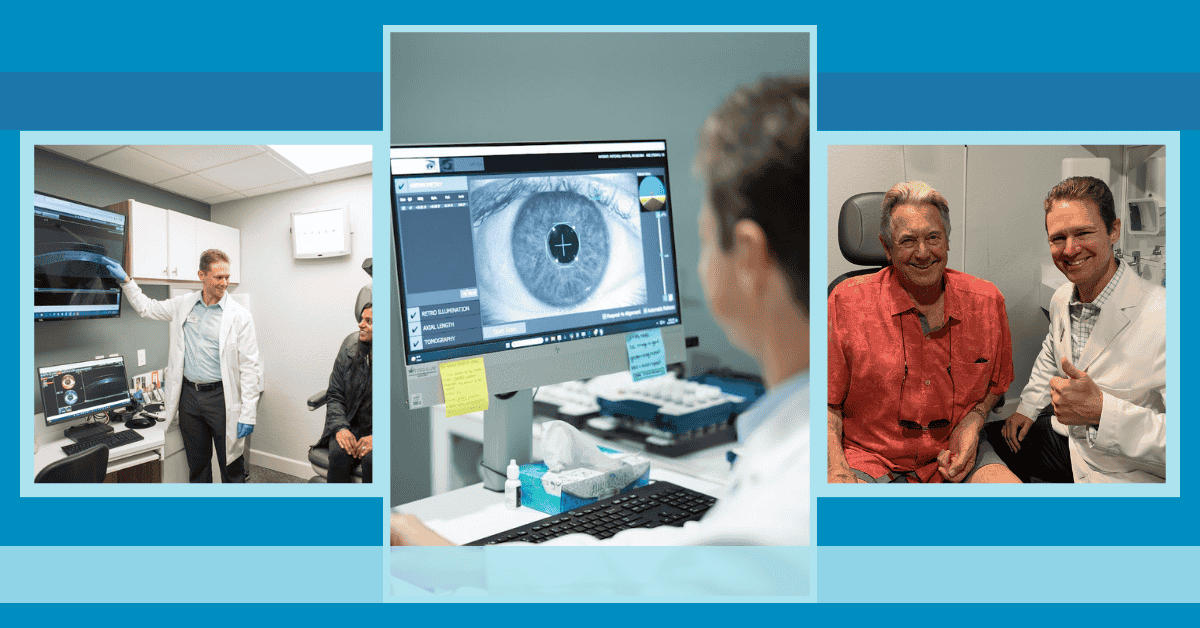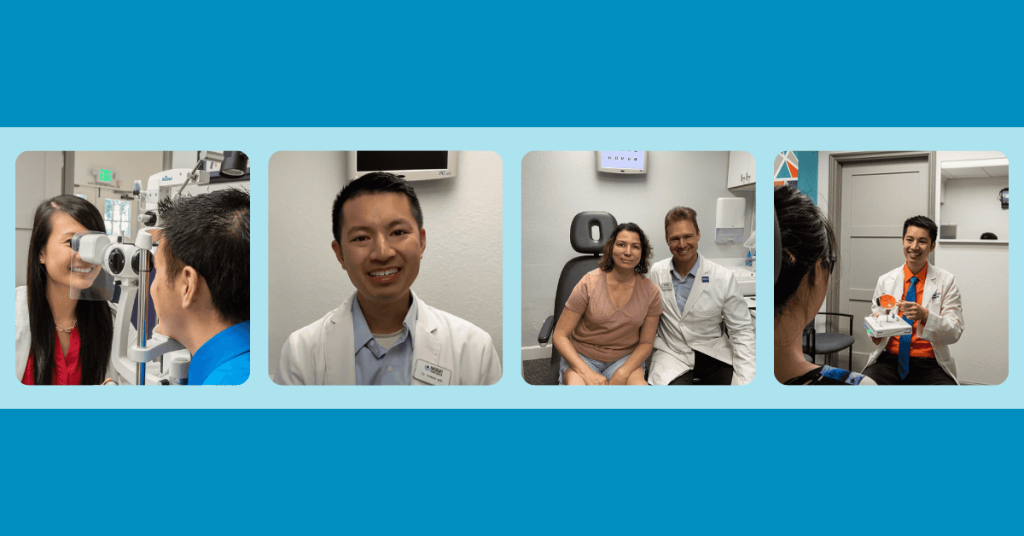Definition and Overview
Noninfectious keratitis is an inflammation of the cornea – the clear, protective dome covering your eye’s front surface – that occurs without infection. This condition can arise from various causes including eye injuries, prolonged contact lens wear, or exposure to irritants. Common symptoms include eye redness, pain, excessive tearing, blurred vision, and light sensitivity. While treatable, prompt medical attention is crucial to prevent potential complications that could affect vision quality. At Insight Vision Center we provide comprehensive care through detailed examinations and collaborative treatment approaches, with state of the art technology and advanced training in contact lenses, ocular disease, and specialty eye care.
Causes and Risk Factors
Common Causes of Noninfectious Keratitis
Keratitis, a condition characterized by inflammation of the cornea, is often distressing for both patients and their families. Understanding its origins can help in its prevention and management. Noninfectious keratitis generally stems from factors such as:
- Eye injuries (scratches, chemical exposure)
- Foreign bodies in the eye
- Contact lens misuse or overuse
- UV light exposure (“snow blindness”)
- Dry eyes and insufficient tear production
- Environmental irritants and chemical fumes
- Mechanical trauma to the cornea
Importance of Contact Lens Wearers Adhering to Guidelines
For those who rely on contact lenses for vision correction, their benefits come with responsibilities. Contact lens misuse significantly elevates the risk of both noninfectious and infectious keratitis. Here’s how you can protect your eyes:
- Adhere to Wearing Schedules: Avoid wearing lenses longer than what’s recommended. Extended wear, especially overnight, increases your risk for keratitis.
- Follow Cleaning Protocols: Maintain a diligent cleaning routine, using appropriate solutions and avoiding “topping off” old solutions in lens cases.
- Water-Related Activities: Remove lenses before swimming to prevent exposure to harmful microbes.
As healthcare professionals, it’s crucial to communicate these risks to patients and reinforce the necessity of proper lens hygiene to mitigate developing complications.
Symptoms of Noninfectious Keratitis
Recognizing Key Symptoms
Experiencing discomfort or visual disturbances can be alarming, especially when they affect the eyes, one of our most precious senses. Noninfectious keratitis, an inflammation of the cornea, can be caused by various factors such as wearing contact lenses for extended periods, physical eye injuries, or even a simple foreign body lodged in the eye. Recognizing the symptoms early can help in seeking appropriate care to protect your vision from more severe complications.
- Redness: The cornea may become visibly red and irritated.
- Pain: A persistent, uncomfortable sensation that does not alleviate.
- Excessive tearing: The eye produces more tears in response to irritation.
- Blurred vision: Difficulty seeing clearly, which might affect daily activities like reading or driving.
- Light sensitivity (Photophobia): A condition where natural or artificial light causes discomfort.
If you or your child experiences these symptoms, it is essential to consult an eye care professional. Early intervention is crucial as untreated keratitis can lead to more severe issues, potentially causing long-term damage to your vision.
Diagnosing Noninfectious Keratitis
Comprehensive Eye Examinations
Comprehensive eye examinations are crucial as they enable us to fully assess the health of your eyes, identifying the presence and extent of keratitis. Our examination includes a detailed inspection of the cornea and surrounding structures using advanced tools like a biomicroscope and slit-lamp. Our office is equipped with state of the art imaging technology for corneal conditions, dry eye, and ocular disease.
Treatment Options for Noninfectious Keratitis
Treatment for noninfectious keratitis typically begins with simple solutions like artificial tears for mild cases and progresses to more advanced options if needed. Our eye doctor may prescribe anti-inflammatory medications, recommend bandage contact lenses to protect the cornea during healing, recommend switching contact lens modalities, advise on dry eye treatment, or in more severe cases, consider immunosuppressive therapy. The treatment approach is customized to each patient’s specific symptoms and underlying causes, with regular monitoring to ensure the best possible outcome. Most cases respond well to these treatments, especially when caught early, allowing patients to return to their normal activities with improved comfort and vision.
Prevention Strategies
Best Practices for Contact Lens Care
Wearing contact lenses offers many benefits, but it also requires careful attention to hygiene to protect your eye health. Improper contact lens care can lead to keratitis, an inflammation of the cornea that can be uncomfortable or even dangerous if left untreated. Here are some key strategies for maintaining healthy, irritation-free eyes:
- Always Wash Your Hands: Before inserting or removing your contact lenses, thoroughly wash, rinse, and dry your hands. This simple step is vital to prevent transferring germs onto your lenses and into your eyes.
- Use the Right Solutions: Select sterile, approved products specifically designed for the type of contact lenses you wear. Steer clear of shortcuts like “topping off” old solution in your lens case.
- Remove Lenses Before Sleeping: Only sleep in lenses if your eye care specialist has specifically directed you to do so. Otherwise, remove them before bed to lower your risk of keratitis.
- Avoid Water Exposure: Never wear your contact lenses while swimming or showering, as water can harbor harmful bacteria and other organisms that may lead to infections.
- Replace Cases and Lenses Regularly: Your contact lens storage case should be replaced every 3 to 6 months, and lenses should be changed according to the scheduled frequency given by your doctor.
Orange County’s Top Rated Medical Eye Care Center
At Insight Vision Center Optometry, our eye doctors Dr. Nathan Schramm, Dr. Than Mai, Dr. Ariel Chen, Dr. Valerie Lam, and Dr. Nhi Nguyen specialize in providing emergency eye care. With years of experience in treating urgent eye conditions, our team is dedicated to offering expert eye care with same day emergency appointments, to protect your vision.

Importance of Regular Eye Examinations
Regular eye examinations are key to early detection and treatment of conditions like keratitis, whether infectious or noninfectious. As part of a comprehensive eye care strategy, consider these points:
- Early Detection: Routine check-ups with an eye care specialist can catch early signs of keratitis and prevent progression to more severe stages, potentially avoiding permanent vision damage.
- Tailored Advice: An exam allows your eye doctor to provide you with personalized recommendations on contact lens use, UV protection, and handling dry eyes.
- Holistic Health Assessment: Eye health is often a window into your overall well-being. Regular exams can reveal broader health issues, assisting in timely interventions.
Annual or bi-annual visits to your optometrist or ophthalmologist ensure that your eyes remain healthy and functional. For children, these examinations are particularly important to monitor development and address any issues promptly, setting them up for a lifetime of good vision health.
Complications Associated with Noninfectious Keratitis
Understanding Potential Risks
Living with noninfectious keratitis can be challenging, especially with its potential risks. As a local eye care practice, we understand the discomfort and concerns you may face. Noninfectious keratitis, often resulting from minor injuries or improper contact lens use, can lead to significant eye discomfort. Symptoms such as pain, redness, or blurry vision can interfere with daily activities, causing considerable distress. Our primary goal is to help you identify these early symptoms and seek immediate consultation to prevent further issues.
For those who wear contact lenses, particularly children and young adults, there’s an increased vulnerability due to extended wear or inadequate cleaning. Our team is committed to educating both patients and parents about effective contact lens hygiene to reduce risks. Furthermore, healthcare professionals who refer patients can rest assured knowing that we provide comprehensive, individualized care to address these specific concerns.
Long-Term Consequences of Untreated Keratitis
Neglecting treatment for keratitis, whether infectious or noninfectious, can have serious long-term effects. If left untreated, it can progress to chronic inflammation, corneal ulcers, and in severe cases, permanent vision impairment or blindness. We emphasize the importance of early detection and intervention. Understanding these potential consequences motivates vigilant eye care.
For healthcare providers referring patients, recognizing the signs of keratitis and the necessity of specialized care is crucial. Our expertise ensures that each patient receives the attention needed to manage and mitigate these risks successfully.
Ultimately, effective management involves not only treatment but prevention strategies. By promoting proactive eye health and timely medical intervention, we aim to reduce the incidence of vision-threatening complications. Rest assured, our commitment is to safeguard your vision, combining expert medical care with empathetic patient support for the best outcomes.
Conveniently situated in Costa Mesa, we attract patients from across Orange County, including Irvine, Huntington Beach, and Santa Ana, for emergency eye care treatment.
When to Seek Further Medical Advice
With keratitis, the symptoms can range in severity and source, making it very difficult to self-diagnose, and crucial to have it evaluated by an eye doctor.
Symptoms often include:
- Redness and pain in the eye
- Excessive tearing or discharge
- Blurred or decreased vision
- Increased sensitivity to light, known as photophobia
- A sensation of having something in the eye
These symptoms, while common to various eye conditions, should be seen by an eye doctor to correctly diagnose and prevent complications. Whether the keratitis stems from an infection caused by bacteria, viruses, fungi, or parasites, or is due to non-infectious factors such as prolonged contact lens wear or eye injury, seeking an eye exam is the best way to safeguard your vision.
If left untreated, keratitis can result in serious outcomes including chronic inflammation, scarring of the cornea, and in severe cases, permanent visual impairment or blindness. It is particularly important for patients using contact lenses to seek care without delay if they experience these symptoms, as improper lens hygiene or overuse can heighten the risk of both infectious and non-infectious keratitis.
Orange County’s Leading Emergency Eye Care Clinic

At Insight Vision Center Optometry, we provide world-class emergency eye care to patients across Orange County. Conveniently located in Costa Mesa, our clinic is recognized for delivering prompt and effective care for urgent eye issues. Whether you’re from Irvine, Huntington Beach, or Santa Ana, our team of highly qualified eye doctors is ready to help with any eye emergencies. From trauma to infections, we offer comprehensive solutions tailored to each patient’s needs.





